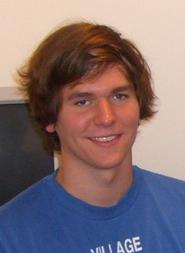
Previous research has shown music to be a powerful tool in shaping mood, memory, and perspective. Yet many neuroscientists consider music to be too abstract and therefore incapable of providing the concrete details that assist in real-world processing. Sam Briggs ’12 hopes to challenge this perspective with his summer research. Briggs will work with Assistant Professor of Psychology Jeremy Skipper to examine some effects of music for his project, “Re-singing.”
Briggs, a psychology major with a philosophy minor, first started modeling the “Re-Singing” study in a series of papers for the course Language Action and the Brain with Skipper. He found the topic to be fascinating and decided to continue exploring it over the summer. Briggs plans to extend his current project into his senior thesis and perhaps in his work after college.
Most neuroscientists believe that music itself is merely “abstract stimuli” and so it cannot hold any specific meaning to the listener. For this reason, music is rarely studied in connection with language and other processing modalities. Briggs hopes to find evidence for the theory that music can indeed hold meaningful information and this meaning can affect how an individual performs on future tasks.
In this context, meaning refers to a specific, unambiguous message. A sentence, for example, holds explicit meaning, but a piece of instrumental music cannot possibly communicate such a clear-cut message at first listen. For his initial experiment, Briggs will accompany a segment of meaningful language with a meaningless piece of music, and then examine whether or not the music alone triggers an association in subjects that affects their future behavior.
Brain activity will be monitored using EEG. The machine works via a network of electrodes on the participant’s scalp that measure brain activity in different regions. Briggs hopes to use fMRI later this summer to scan participants’ brain activity as they participate in his experiments. He also has a passion for Clinical Psychology and ultimately hopes that his results can benefit and advance the practice of music therapy.
This summer, Briggs is also assisting with a few of Professor Skipper’s other projects, funded by an NIH grant Skipper recently received. Briggs has enjoyed meeting and working with his lab mates, and he looks forward to the opportunity to focus on his project for the next few weeks.
Briggs has always been very interested in music, but has never had a chance to thoroughly pursue it because of a concentration in the sciences. Instead, he satisfies his love of music as general manager of Hamilton’s radio station WHCL, by producing his own music, and as a member of a band. He is also chair of the Campus Activities Board, a contributor to IMF and Media Board, and is currently interning for ITS by specializing in multimedia and digital technology.
Eventually, Briggs hopes to publish his work to shed light on the way that music is used culturally and how it affects the listener neurophysiologically. Even though most people would claim to have some personal connection to music, its perceived importance to human neuroscience is minimal, and Briggs wishes to expand this area.
Briggs is a graduate of Berwick Academy in South Berwick, Maine.
Posted June 1, 2011
